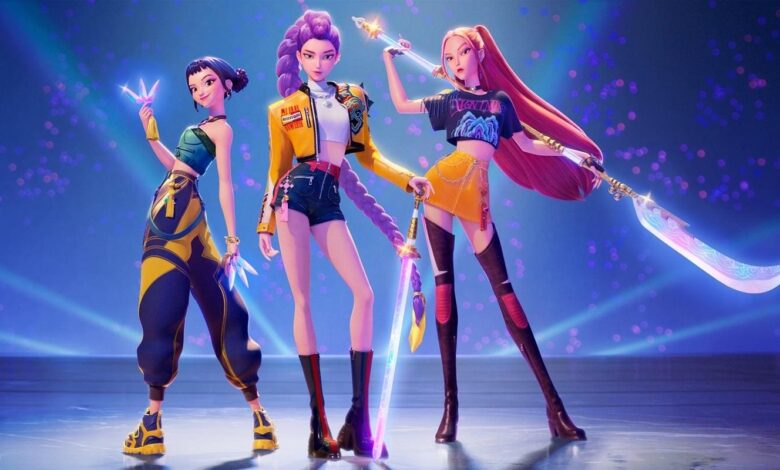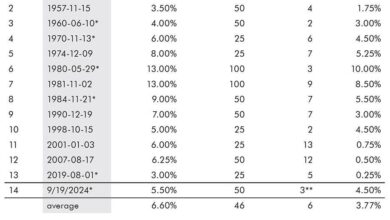‘KPop Demon Hunters’ Directors Take You Behind Netflix’s Animated Hit

📝 usncan Note: ‘KPop Demon Hunters’ Directors Take You Behind Netflix’s Animated Hit
Disclaimer: This content has been prepared based on currently trending topics to increase your awareness.
(L-R): Zoey, Rumi and Mira are members of the K-pop group HUNTR/X in ‘KPop Demon Hunters’
Courtesy of Netflix
The Netflix smash hit KPop Demon Hunters continues to generate buzz more than a month after its release. Since its June 20th premiere, the animated musical fantasy from Sony Pictures Animation has topped the Netflix charts and is now the streamer’s most watched original animated film of all time.
The film’s soundtrack has drawn just as much attention, with all eight of its original songs charting on the Billboard Hot 100 for several consecutive weeks. Seven of these tracks also appear in the top 20 on the U.S. and global Spotify charts, with “Golden” sitting at No. 1 on both as of this writing.
KPop Demon Hunters has become nothing short of a global cultural phenomenon, thanks in part to Netflix’s reach of over 300 million subscribers across more than 190 countries. A limited theatrical release in the U.S. also made the movie eligible for Oscars consideration, and industry observers are now saying that it could be a serious contender for both Best Animated Feature and Best Original Song (for “Golden”).
Even co-directors Maggie Kang and Chris Appelhans—both animation veterans—didn’t expect the film to blow up like it did. “I don’t think anybody [expected] this,” Kang admitted.
Though the title and premise—a trio of K-pop stars who lead secret double lives as demon hunters—sound quirky, the film’s blend of animation, traditional Korean culture and mythology, and K-pop has clearly struck a chord with critics and audiences alike.
Rumi in ‘KPop Demon Hunters’
Courtesy of Netflix
However, K-pop “wasn’t part of the original concept,” according to Kang. After deciding on demons and female demon slayers, she wondered if K-pop could be woven in. “It was kind of the last ingredient added,” she said. “The possibilities for dance-fighting with music and hitting punches to the beat felt really fresh—an opportunity to visually switch up things the way that only animation can. Treating those sequences like music videos felt really fun.”
Earlier this month, I spoke with both Kang and Appelhans about bringing their vision to life; the countless nods to Korean language, art, mythology and culture embedded throughout KPop Demon Hunters; and the overwhelming response their movie has received from viewers worldwide. While part of our conversation was previously published in The New York Times, the rest was ultimately cut due to space, so below are additional edited excerpts from that interview.
Regina Kim: Were there any other big champions for this project, besides Aron Warner [the producer who first heard Kang’s pitch for KPop Demon Hunters]?
Maggie Kang: Aron was the producer attached through development, and [after] he left, Michelle [Wong] came in and produced the movie through production.
Kristine Belson, who is the president of Sony [Pictures Animation], is amazing. She’s been a champion from the very beginning. Sony is the place that it is mostly because of her. She has created this safe haven for directors to not be afraid to try new things and tell original stories.
Also, Spring Aspers, who’s the president of Sony Pictures Music Group, has been a huge champion of this from the get-go as well. Early on, she asked me questions like, “How do you envision the group coming together? Do you want real idols, well-known people?”
Ultimately, we had to treat the two casts—the music vocals and the acting—separately. We needed the music early on, but casting for the actors was a lot harder, so it happened at two separate times.
We cast EJAE [who provides the singing voice for Rumi] first. We had the demos and knew that we wanted EJAE to do the vocals.
LOS ANGELES, CALIFORNIA – JUNE 16: Ejae attends Netflix’s “KPop Demon Hunters” Special Screening at Netflix Tudum Theater on June 16, 2025 in Los Angeles, California. (Photo by Alberto E. Rodriguez/Getty Images)
Getty Images
Kim: How did you find EJAE?
Kang: My husband [Radford “Rad” Sechrist], who is also a director, did this show called Kipo and the Age of Wonderbeasts on Netflix. And [the series’] composer Daniel Rojas was like, “I have this friend who writes K-pop music. She lives in New York, and her name is EJAE. I could reach out to her for a song.”
So EJAE created the song. It’s really cute and catchy but very authentically K-pop. When we were trying to do these demos, Rad was like, “Why don’t you just reach out to EJAE?” And that’s how EJAE was brought on. I’m sure she did not realize this was going to be a six-year journey for her. [Laughs]
Rumi, Mira and Zoey in ‘KPop Demon Hunters’ Courtesy of Netflix
Kim: In terms of casting the actors, who was the easiest to cast, and was there anyone who you thought was a long shot but were surprised by when they said yes?
Chris Appelhans: I feel like May Hong was the easiest as Mira, because she is Mira. Our first call with her, she was basically like, “Sorry guys, I only have 30 minutes because, ugh, I have to do this runway show that my friend asked me to do, and I don’t wanna do it.” She was so cool and so not concerned about being cool. Maggie and I were texting within two minutes like, “This is it!”
Kang: She’s Mira!
Appelhans: Yeah, it’s Mira! To May’s credit, I thought she did a really awesome job. What Mira needed in the film was a vulnerability and a protective love that was happening underneath. And she worked really hard to tap into that. I think her performance is really nuanced.
And Maggie, you could speak to this, but Lee Byung-hun, I was like—
Kang: Oh yeah. No way.
Appelhans: There’s no way. But please!
Kang: Yeah—but please! That was one of the highlights of my career—pitching the movie to him. He was very interested and asked questions.
Appelhans: He’s so diligent too. He’d do 15, 16 takes, and Maggie and I would be like, “I think we got it.” He’d be like, “No, I’m going to do five more. I feel like I could do better.” Ahn Hyo-seop was the same way—really driven to excel and never phoning it in.
Kang: I remember the first lines out of Lee Byung-hun’s mouth. We looked at each other and were like, “Ohhh, this is it! This is why he is him!” It was incredible.
Kim: Who was the hardest to cast?
Kang: It was Rumi. Main characters are usually the hardest to cast. She’s very layered. For all the girls, we looked at casting Koreans in Korea, but there was a language barrier. We landed with Arden because she has a lot of experience, and she’s already worked with Netflix. I think for me, as a Korean woman working in the industry for 20-something years, this kind of role [meant] a lot. And I felt like it would probably mean a lot to her, too.
KPOP DEMON HUNTERS – (L-R) Ji-young Yoo (voice of ZOEY), Arden Cho (voice of RUMI) and May Hong (voice of MIRA)
Ricky Middlesworth/NETFLIX
Kim: You were able to get some top K-pop songwriters and producers to work on the film’s soundtrack, including Teddy Park [who co-founded The Black Label and has written hits for iconic K-pop groups like 2NE1, BIGBANG and BLACKPINK]. How did you get him and The Black Label team to sign on to this project? Was it hard to convince them?
Kang: It wasn’t that hard, actually.
Appelhans: We went to Korea, and we had a really cool pitch deck with beautiful artwork, a couple of sequences and a 15-minute walkthrough of the story. We went up to the magic tower of Teddy’s The Black Label headquarters and into his awesome room. He was very cool in his hoodie and [said] nothing.
We pitched everything, and he’s like, “This is actually really cool, you guys.” We’re like, “Oh my God, he thinks it’s cool! We gotta play it cool.” So when he agreed, it felt like a big boost for us.
KPOP DEMON HUNTERS – (L-R) Zoey (voice by JI-YOUNG YOO), Rumi (voice by ARDEN CHO) and Mira (voice by MAY HONG)
Courtesy of Netflix
From that point, we were able to bring in Ian Eisendrath, who served as the executive music producer, and brought in people like Lindgren and Stephen Kirk. I think it wouldn’t have happened without [Teddy’s] buy-in.
Then The Black Label, EJAE and all those people formed into teams. We would give those teams different songs, and they would take cracks at it, sometimes many cracks before we landed on the right solution. You know when you listen to a great song, and it gives you butterflies in your stomach? By the time a song makes it into the movie, it’s giving us butterflies.
Kang: We knew that first and foremost, the songs had to be legitimately accepted into the K-pop space and the audience. So we felt that it was important to partner with a label, because that was the only way we could get that right sound. There’s a way that K-pop music is produced, so it was really to legitimize this album and this group right off the bat.
Saja Boys in ‘KPop Demon Hunters’
Courtesy of Netflix
Kim: Have you been engaging with any of the fan reactions and memes online?
Kang: I think both our households, Michelle and everybody who was very involved with this process—I don’t think we got much sleep in the first 12 days or so. We were just on TikTok and [other] socials.
I did, in the beginning, engage with a lot of the fans, but I’ve had to stop because I can’t engage with some and then not [others]. So I’ve really just been engaging with the crew to celebrate with them. But it’s been hard not to say anything or answer questions. We’re doing a lot of interviews, and hopefully we’re answering a lot of fan questions, but a lot of [them] happen to be sequel-related, so we try to dodge those. And lore-related, which we also don’t want to give away too much because a lot of it can tip off things for possible sequels.
Kim: I think what really blew my mind was seeing all these fans who weren’t Korean doing their own research into all the film’s references to traditional Korean art and mythology and sharing what they’ve learned on Threads and Instagram. Did you anticipate that fans of the film would go to such lengths to figure out and analyze all these references?
Kang: Oh yeah. [Laughs]
Kim: Really? Was that your intention?
Kang: No. I mean, we knew that we were going to be scrutinized if we didn’t get something right. We also had a cultural advisor, Professor Mijeong Mimi Kim [who teaches at Washington University in St. Louis]. Every time we put a screening up, she would flag some things.
[Many people on] this crew were not Korean, but we quickly learned that these artists were so excited to dive into a culture that they didn’t know and learn it. Being Korean, it was just incredible to sit in a review [where] people are talking about a gat, and they’re using that word like they know it—because they do. It really brought tears to my eyes.[In a follow-up email, the directors gave additional context around Professor Kim’s role: “She helped us integrate cultural specificities authentically in both storytelling and character/environment/prop design. She was an important part of the process from beginning to end.”]
In ‘KPop Demon Hunters,’ the Saja Boys are wearing traditional Korean hats called a “gat” when they’re in their demon form.
Courtesy of Netflix
Kim: The term “Honmoon”—is that supposed to mean “soul gate” or “soul door”? Is that literally what it refers to?
Kang: Yeah. We always felt like this word was kind of stupid. Any Korean crew members that came on would be like, “Um, what is this ‘honmoon’ that you keep talking about?” Early on when we were developing the concept, we just kept calling it a “barrier” or “the shield.” And we quickly realized this thing needed a name. It’s a new concept—we’re building new fantasy lore, and it felt odd to give it an English name. So I wrote down a bunch of Korean words that mean “barrier” and “door,” but all those words are very hard to say in English. I came up with this word “honmoon,” which is literally a “spirit gate” or “spirit door.” It just felt fitting. It was—along with our title—very “temp,” but then [it] became canon.
Kim: This is a weird question, but I’m going to ask it anyway. Since this movie has many elements of Korean shamanism in it, did you hire a shaman to perform a gut ceremony so that this movie could do well?
Appelhans: [Laughs]
Kang: [Laughs] No, but it almost feels like we did.
KPop Demon Hunters is available to stream on Netflix.




